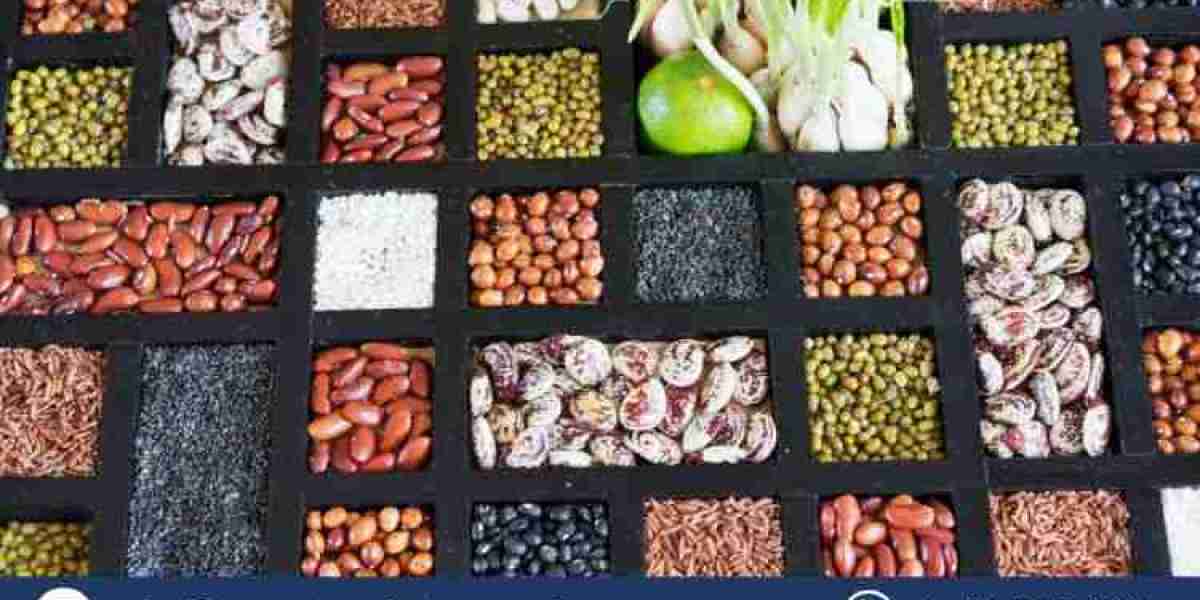The South Africa seeds market has witnessed significant growth in recent years, driven by advancements in agricultural practices, technological innovations, and increasing demand for high-quality crops. The market is expected to grow at a CAGR of 5.3% between 2025 and 2034, reflecting a strong potential for continued expansion. In this article, we will explore various aspects of the South African seeds market, including its size and share, market dynamics, growth factors, opportunities and challenges, and competitor analysis.
Overview of the South Africa Seeds Market
The South Africa seeds market plays a crucial role in the agricultural industry, as seeds are the foundation of crop production. South Africa has a well-established agricultural sector that produces a wide variety of crops, including maize, wheat, sunflower, soybeans, and more. The market for seeds is characterized by the demand for high-yielding, disease-resistant, and genetically improved seeds.
Several factors contribute to the growth of the South African seeds market. Key drivers include advancements in seed technology, the increasing adoption of modern farming practices, and a growing demand for food due to the rising population. Additionally, the demand for better crop varieties to combat climate change and optimize land use is further fueling market growth.
With the introduction of genetically modified (GM) seeds, the South African seeds market has seen a shift toward the use of seeds that can withstand harsh environmental conditions and diseases. This is particularly important in a country that faces significant challenges related to water scarcity and climate variability.
Get a Free Sample Report with a Table of Contents:
https://www.expertmarketresearch.com/reports/south-africa-seeds-market/requestsample
Size & Share of the South Africa Seeds Market
Market Size:
- 2024 Market Size: The South African seeds market size is projected to be valued at approximately USD 1.5 billion in 2024.
- 2034 Market Size: By 2034, the market is expected to grow at a CAGR of 5.3%, reaching a value of around USD 2.8 billion.
Market Share:
- Field Crops: Field crops, particularly maize, wheat, and soybeans, dominate the South Africa seeds market. The field crop segment holds the largest share due to their importance in food production and export markets.
- Vegetable Seeds: The vegetable seeds segment is also growing, driven by increasing demand for high-quality vegetable varieties for both domestic consumption and export.
- Flower & Ornamental Seeds: While smaller in size, the market for flower and ornamental seeds is growing as interest in horticulture and landscaping increases in South Africa.
Market Dynamics & Trends in the South Africa Seeds Market
The dynamics of the South Africa seeds market are influenced by several factors that shape its growth trajectory:
Technological Advancements in Seed Development: The continuous development of genetically modified (GM) seeds and hybrid varieties is one of the key trends in the market. These advanced seeds offer higher yields, better resistance to pests, and tolerance to harsh environmental conditions, thus benefiting farmers.
Government Support and Policies: The South African government has implemented various policies to support the agricultural sector, including seed development and distribution programs. This support encourages farmers to adopt high-quality seeds, which in turn promotes the growth of the seed market.
Sustainability and Organic Farming: There is a growing shift toward sustainability and organic farming practices, which has created demand for non-GMO and organic seeds. Consumers are becoming increasingly aware of environmental impacts, leading to a rise in demand for eco-friendly seed options.
Climate Change and Water Scarcity: The challenges posed by climate change and water scarcity in South Africa are pushing for the development of drought-resistant and water-efficient seed varieties. This trend is driving the adoption of genetically modified seeds that can withstand adverse weather conditions.
Rising Agricultural Exports: South Africa’s agricultural exports, including maize, wheat, and other crops, have a strong presence in global markets. The demand for high-quality seeds that meet international standards has spurred growth in the seed industry.
Increase in Smallholder Farmers: Smallholder farmers, who make up a significant portion of the agricultural workforce in South Africa, are increasingly adopting improved seed varieties to enhance their productivity. This trend is contributing to the growth of the seed market as more farmers look for ways to improve crop yields.
Growth of the South Africa Seeds Market
The South Africa seeds market is set to experience robust growth over the coming decade due to the following factors:
Rising Demand for Food Production: As the population continues to grow, there is an increasing need for higher agricultural productivity to ensure food security. Improved seed varieties play a crucial role in achieving this goal, driving demand for quality seeds in the market.
Adoption of Modern Agricultural Practices: The growing adoption of modern farming practices such as precision agriculture, use of farm management software, and improved irrigation systems is leading to better seed utilization. This, in turn, is fueling the growth of the seeds market in South Africa.
Investment in Seed Research and Development: Investments in seed research and development are expected to boost the availability of innovative and high-yielding seeds. This includes research into GM seeds that can withstand specific pests and diseases, enhancing crop quality and yield.
E-commerce and Digital Platforms: The rise of e-commerce platforms has made it easier for farmers to access high-quality seeds. This trend is expected to continue as more online stores and digital platforms offer a wide variety of seeds to cater to different farming needs.
Increased Export Opportunities: South Africa’s agricultural products, such as maize and wheat, are in demand internationally. This has increased the need for superior seed varieties, both for domestic production and export markets, further driving market growth.
Market Opportunities and Challenges in the South Africa Seeds Market
Opportunities:
Organic and Non-GMO Seeds: There is a growing demand for organic and non-GMO seeds as consumers become more health-conscious. This trend presents an opportunity for seed producers to develop and supply organic seeds that cater to a specific market segment.
Drought-Resistant Seeds: With water scarcity being a major challenge in South Africa, there is a significant opportunity for seed producers to focus on developing drought-resistant and water-efficient seed varieties, especially for field crops like maize and wheat.
Agricultural Export Growth: South Africa's strong agricultural export market offers a significant opportunity for seed producers. As demand for high-quality crops increases internationally, the need for superior seeds will grow, providing a lucrative market for seed suppliers.
Government Incentives: Government incentives for sustainable farming practices and the promotion of high-yielding seeds can drive market growth by encouraging more farmers to adopt advanced seeds that increase crop production.
Challenges:
Regulatory Challenges: The regulatory environment for seed production, particularly genetically modified seeds, can be a challenge. Strict regulations and delays in approval for new seed varieties may impact the speed at which new products are introduced to the market.
High Seed Costs: The cost of high-quality seeds, particularly genetically modified or hybrid varieties, can be a challenge for smallholder farmers in South Africa. This could limit market growth, as cost-effective alternatives may be more appealing.
Pest and Disease Resistance: While GM seeds offer pest resistance, new pests and diseases can still emerge, which may affect seed effectiveness. Continuous research and innovation are required to address these challenges.
Climate Variability: Climate change presents a significant challenge to agriculture in South Africa. Seed producers must constantly innovate to create seed varieties that can withstand extreme weather patterns and fluctuating rainfall.
Competitor Analysis in the South Africa Seeds Market
The South Africa seeds market is competitive, with several global and local players operating in the sector. Some of the key players include:
BASF: A global leader in seed production and crop protection, BASF provides a wide range of high-quality seeds for various crops, including maize, wheat, and soybeans. Their focus on sustainable farming practices and innovative seed technologies positions them as a major player in the South African market.
Monsanto (Bayer): A key player in the genetically modified seed market, Monsanto, now a part of Bayer, is known for its range of genetically modified seeds, including drought-resistant and pest-resistant varieties. Their dominance in the field of GM seeds continues to shape the market.
Syngenta: Syngenta is another prominent player in the South African seeds market, offering a variety of hybrid seeds designed to meet the specific needs of local farmers. The company focuses on developing seeds that are resistant to pests and diseases.
Pannar Seed: A South African-based seed company, Pannar Seed is one of the leading suppliers of hybrid seeds, especially in the maize and sunflower sectors. Their strong presence in the local market and their focus on research and development give them a competitive edge.
SeedCo: SeedCo is a leading African seed company known for its high-quality maize, wheat, and sorghum seeds. The company’s strong research and development capabilities make it a formidable player in the South African seeds market.
DowDuPont: DowDuPont, with its Pioneer brand, is a major global player in the seed market. The company offers advanced seed solutions in South Africa, including genetically modified and hybrid seeds that cater to the needs of modern farmers.
These companies dominate the South Africa seeds market by offering high-quality products, innovative solutions, and strong distribution networks. Their ability to adapt to changing market conditions and consumer demands will ensure their continued growth and leadership in the sector.








